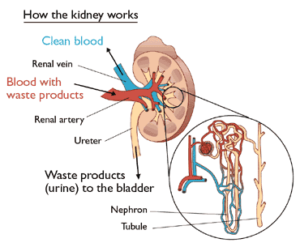 What do the kidneys do for the body? The kidneys process blood to remove waste products and excess water. That’s their only function, but it’s a vital one for health. Every day, the kidneys go through about 50 gallons of blood to remove about half a gallon of waste products, deposit them in urine, and make it possible for you to expel them from your body. Without this activity, waste products would build in the body to toxic levels, endangering health and eventually proving fatal.
What do the kidneys do for the body? The kidneys process blood to remove waste products and excess water. That’s their only function, but it’s a vital one for health. Every day, the kidneys go through about 50 gallons of blood to remove about half a gallon of waste products, deposit them in urine, and make it possible for you to expel them from your body. Without this activity, waste products would build in the body to toxic levels, endangering health and eventually proving fatal.
When a patient suffers from either acute or chronic kidney failure, the ability of the kidneys to process blood and remove waste materials declines. There’s a certain amount of redundancy and excess ability built into the functioning of the kidneys (for example, the body has two of them but can get by with one), and so reduced kidney function, although always a cause for concern, is not necessarily a cause for alarm.
The damage must proceed to high levels before it becomes a serious risk to health. However, kidney damage can be progressive over time, so when it’s diagnosed it’s always a call to monitor the damage and seek the cause with a view to arresting the progression of kidney disease.
Tests For Kidney Function
As a medical term, “kidney function” or “renal function” refers not only to what the kidneys do but also to how well they are doing it. Diagnostic tests can be conducted when there are signs of conditions which can cause kidney damage (for example, high blood pressure) to determine whether any kidney functioning has been lost and if so how severe the loss is. The main test for kidney function is a blood test for
glomular filtration rate. This is done by measuring the amount of creatinine (a waste product from metabolism) in the blood. Creatinine levels are compared to norms for the patient’s age, gender, and race.
Other tests that can indicate problems with kidney function are tests for the presence of albumin (blood protein) in the urine –
What Affects Kidney Function?
Kidney function can be reduced (rather obviously) by damage to the kidneys. This in turn can result from a number of different causes. The most common cause of kidney damage is probably high blood pressure, but physical trauma, diabetes, and a number of other factors can cause damage to the kidneys and result in a diagnosis of either acute kidney failure (which can be severe but is generally reversible) or chronic kidney disease (which progresses over time and is not reversible).
The nature of the damage from these various causes is not the same. High blood pressure causes damage to the blood vessels in the kidney and is therefore a form of physical damage. Diabetes, however, leaves excess glucose (blood sugar) in the blood due to a reduced ability of the body to process and metabolize sugars, and this excess glucose acts as a poison that can damage the cells of the kidney.
Kidney disease can also result from hereditary factors and these can take a number of different forms.
Dialysis
When kidney function is severely impaired, dialysis may become necessary to replace it and maintain health. Dialysis refers to several methods of artificially filtering the blood, replacing the functions of kidneys that have lost the ability to do their jobs. Dialysis employs permeable membranes (either artificial ones or the body’s own peritoneum) and fluids that cause the impurities in the blood to cross the permeable membrane into the fluids for disposal. There are two main types of dialysis. Clinical or external dialysis employs a machine with an artificial filter. The blood is removed from the body and passed across the membrane with dialytic fluid on the other side. Peritoneal or internal dialysis places dialytic fluid in the abdominal cavity and allows the body’s natural blood circulation to let impurities cross the peritoneum into the dialytic fluid.
Maintaining Healthy, Functioning Kidneys
To maintain healthy and functioning kidneys, one should avoid the risk factors for kidney disease and also drink plenty of water. Maintaining a healthy body weight, and avoiding risk factors for high blood pressure and diabetes, can help to keep the kidneys functioning well and avoid chronic kidney disease. (Acute kidney failure, which is usually the result of trauma, poisoning, or infection, is a different matter.) Much of this is dietary. A healthy level of exercise is also helpful.
